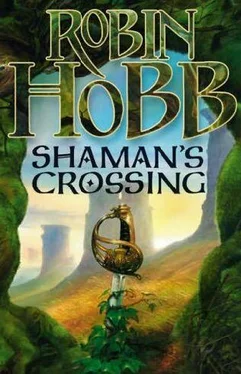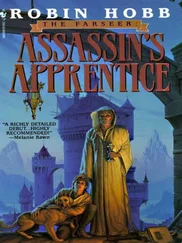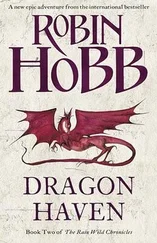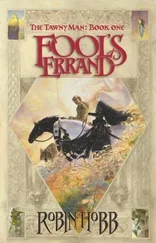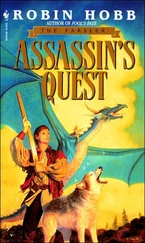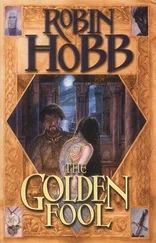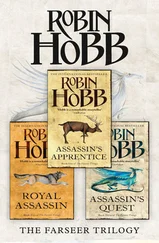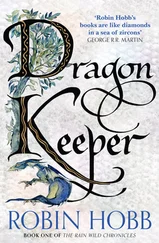There had been other changes as well. My scrawny, petulant tutor had been replaced twice over as my father’s requirements for my education had stiffened. I had two instructors now for my afternoon lessons, and I no longer dared to be tardy for them. One was a wizened old man with severely bound white locks and yellow teeth, who taught me tactics, logic, and to write and speak Varnian, the formal language of our ancient motherland, all with the liberal use of a very flexible cane that never seemed to leave his hand. I believe that Master Rorton’s diet consisted mostly of garlic and peppers and he nearly drove me mad by constantly standing at my shoulder watching every stroke of my pen as I hunched at my desk.
Master Leibsen was a hulking fellow from the far west who taught me both the theory and practise of my weapons. I could shoot straight now, both standing and mounted, with pistol and long gun. He taught me to measure powder as accurately by eye as most men could with a balance, and how to pour my own ball shot as well as maintain and repair my weapons. That was only lead ball, of course. The more expensive iron shot that had helped us defeat the plainspeople had to be turned out by a competent smith. My father saw no reason for me to be using it up on targets. From Master Leibsen I also learned boxing, wrestling, staves, fencing and, very privately after many entreaties on my part, to both throw and fight with knives. I relished my lessons with Leibsen as much as I detested the long afternoons with Master Rorton of the foul breath.
I had one other teacher in the spring of my sixteenth year. He did not last long and yet he was the most memorable of them. He stayed briefly, pitching his small tent in the shelter of a hollow near the river and never once approached the manor house. My mother would have been both terrified and offended if she had known of his presence, scarcely two miles away from her tender daughters. He was a plains savage and my father’s ancient enemy.
On the day I was to meet Dewara, I rode out innocently with my father and Sergeant Duril. Occasionally my father invited us on his morning rounds. I thought my ride that morning was such an outing. Usually it was a pleasant ride. We would move leisurely, lunch with one of his overseers, and halt at various cottages and tents to consult with the shepherds and the orchard workers. I took no more than I would usually carry on a pleasure ride. As the spring day was mild, I did not even take a heavy coat, but only my light jacket and my brimmed hat against the bright sunlight. The sort of country we lived in meant that only a fool set out on any ride unarmed. I carried no gun with me that day, but I did have a cavalry sword, worn yet serviceable, at my hip.
My father rode on one side of me, with Sergeant Duril on the other. It felt odd, as if they escorted me somewhere. The sergeant looked sullen. He was often taciturn, but his silence that day was weighted with suppressed disapproval. It was not often that he disagreed with my father about anything, and it filled me with both dread and intense curiosity.
Once we were well away from the house, my father told me that I would meet a Kidona plainsman that day. As he often did when we spoke of specific clans, my father discussed Kidona courtesy, and cautioned me that my meeting with Dewara was a matter for men, not to be discussed later with my mother or sisters, nor even mentioned in their hearing. On the rise above the plainsman’s camp, we halted and looked down upon a domed shelter made from humpdeer skins pegged to a wicker frame. The hides had been cured with the hair on so that they shed water. His three riding beasts were picketed nearby. They were the famous black-muzzled, round-bellied, striped-legged mounts that only the Kidona bred. Their manes stood up stiff and black as hearth brushes and their tails reminded me of a cow’s more than a horse’s. A short distance away, two Kidona women stood patiently next to a two-wheeled cart. A fourth animal shifted disconsolately between the shafts of the high-wheeled vehicle. The cart was empty.
A small smokeless fire burned in front of the tent. Dewara himself, arms folded on his chest, stood looking up at us. He did not notice us as we arrived; he was already standing, looking toward us, as we came into view. The man’s prescience made the hair on my arms stand up and I shivered.
“Sergeant, you may wait here,” my father said quietly. Duril chewed at his upper lip, then spoke. “Sir, I’d rather be closer. In case I’m needed.”
My father looked at him directly. “Some things he cannot learn from me or from you. Some things can’t be taught to you by a friend; they can only be learned from an enemy.”
“But, sir—”
“Wait here, Sergeant,” my father repeated, and that closed the subject. “Nevare, you will come with me.” He lifted a hand, palm up, in greeting and the plainsman below returned the sign. Father stirred his horse to a leisurely walk and started down the rise to the Kidona’s camp. I glanced at Sergeant Duril, but he was staring past me, mouth set in a flat line. I gave him a nod anyway and then followed my father. At the bottom of the rise, we dismounted and dropped our horses’ reins, trusting our well-trained mounts to stand. “Come when I motion to you,” my father said softly. “Until then, stand still by the horses. Keep your eyes on me.”
My father approached the plainsman solemnly, and the old enemies greeted one another with great respect. Privately, my father had cautioned me to treat the Kidona with the solemn deference I extended to any of my tutors. As a youth, I should bow my head to my left shoulder when I first greeted him, and never spit in his presence or show my back to him, for such were the courtesies of his people. As my father had bid me, I stood still and waited. I could almost feel Sergeant Duril’s stare on us, but I did not look back at him.
The two spoke to one another for a time. Their voices were lowered and they spoke in the trade language, so I caught little of what they said. I could tell only that they spoke of a bargain. At length my father gestured to me. I walked forward and remembered to bow my head to my left shoulder. Then I hesitated, wondering if I should offer to shake hands as well. Dewara did not offer his hand, and so I kept mine by my side. The plainsman did not smile but looked me over frankly as if I were a horse he might buy. I took the opportunity to appraise him as bluntly. I had never before seen a Kidona.
He was smaller and more wiry than the plainsmen I was familiar with. The Kidonas had been hunters, raiders and scavengers rather than herders. They had regarded all the other peoples of the plains as their rightful prey. The other plainsmen had dreaded their attacks. Of all our enemies, the Kidonas had been the most difficult to subdue. They were a hard-natured people. Once, after the Gernian horse troops had defeated the Rew tribe, the Kidona had swept in to raid the demoralized people and carry off what little was left to them. My father spoke of them with head-shaking awe at their savagery. Sergeant Duril still hated them.
During his raiding years, a Kidona man would eat only meat, and some filed their front teeth to points. Dewara had. He wore a cloak woven from narrow strips of light leather, perhaps from rabbits. Some of the strands had been dyed to form a pattern like hoof-prints. He wore loose brown trousers and a long-sleeved white robe that came just past his hips. It was belted with a bright strip of beaded braiding. He was shod in low boots of soft grey leather. His head was uncovered, and his steel-grey hair stood out from his head in a short stiff brush that reminded me of a dog’s lifted hackles, or perhaps his horse’s mane. At his hip hung a short curved blade, the deadly bronze swanneck of his people, as much tool as weapon. The hilt was wrapped in fine braids of human hair in varying shades. When I first met him, I thought they were battle trophies. Later he would explain that such weapons were passed down from father to son, and that the braids of hair were the blessing of his ancestors passed down with the swanneck. Such a blade was sharp enough to be flourished in a battle charge, but sturdy enough to chop meat tor the pot. It was a formidable weapon and a utilitarian tool, the finest weapon a Kidona could use without resorting to iron.
Читать дальше
